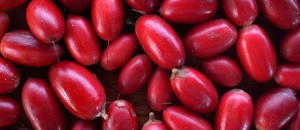This miracle berry that grows in West Africa contains Miraculin, a glycoprotein which was first extracted back in 1968. The local population knew the effects for much longer and chewed the fruit pulp to make sour maize bread tastier. The surface of our tongue is covered by a multitude of different receptors to detect tastes from sweet to umami. Just like sugar and artificial sweeteners like aspartame, the miraculin in the berry binds to your sweet taste receptors, but far more strongly. The acid present in sour foods sparks a chemical reaction that causes miraculin to temporarily distort the shape of these taste receptors, enhancing them and making them so sensitive that the powerful sweet signals they are sending to your brain completely drown out the sour ones.
Miraculin is different because it binds to the human sweet taste receptor like sugar and aspartame but doesn’t induce a sweet sensation. It has a neutral pH and binds to our sweet taste receptor without activating it. So should you eat something with an acid pH, miraculin induces the receptor activation and hides the acidity. Gradually, through the buffering capacity of saliva allowing the pH to increase, the amazing phenomenon disappears. That is why vinegar tastes as sweet as syrup once your tongue is covered with miraculin. In the French laboratory of Loïc Briand, researchers have also found that low miraculin concentration can mask the acidity and cause a very low perception of sweetness four protein with a sweet power, like thaumatin, monelin, brazzein and miraculin coming from African plants. This awesome protein could be very interesting for diabetes and obesity sufferers to replace sugar.
Homaro Cantu, a chef in Chicago has just opened the Berrista Coffee last December. The café uses the berries to create a variety of sensations. Before receiving their orders, hungry clients first chew a berry before digging in their donuts and cakes that contain less sugar. Customers eat the miraculin berry and for the next hour, enjoy a “flavor-tripping” experience as sour turns to sweet in their mouths.
As a chef and entrepreneur, Homaro Cantu has a reputation for an avant-garde approach to gastronomy. He believes the answer to one day eliminating sugar from our diets lies in a protein known as miraculin which was first discovered almost 50 years ago. Miraculin is a taste-modifier, one of only a handful of such naturally-occurring molecules in the world. It is found in the berries of a plant known as Synsepalum dulcificum or, colloquially, the “miracle fruit,” which grows in parts of West Africa. As a result, this berry has a very promising future to replace sugar even if for the moment, it is not really present in the agro-industry. Scientists are on the way to lower the harvesting price through bioengineering by working on genetically modified tomatoes with miraculin.
For more information please visit: www.berrista.com


Comments are closed.